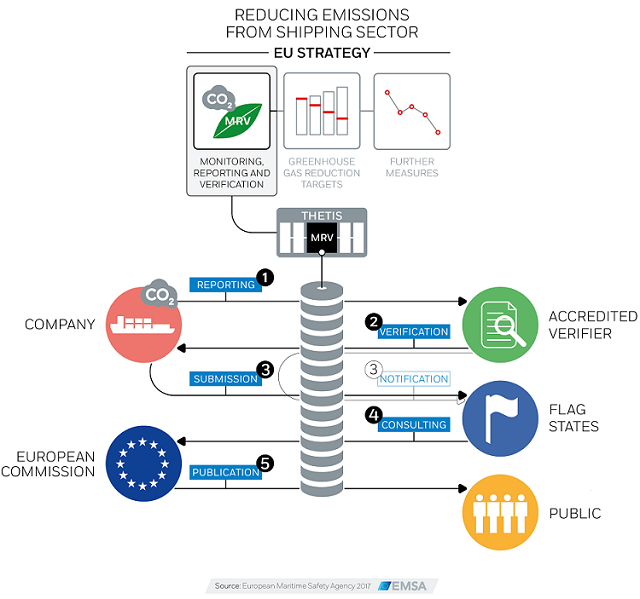EMSA Launches Monitoring, Reporting and Verification System
 The European Maritime Safety Agency (EMSA) has launched its monitoring, reporting and verification system THETIS-MRV to help reduce CO2 emissions from E.U. shipping.
The European Maritime Safety Agency (EMSA) has launched its monitoring, reporting and verification system THETIS-MRV to help reduce CO2 emissions from E.U. shipping.The system went live on Monday will enable companies responsible for the operation of large ships using E.U. ports to report their CO2 emissions, as required by law from January 1, 2018 under the E.U.’s Monitoring, Reporting and Verification Regulation. The rules apply to ships above 5000 GT which account for around 55 percent of ships calling at E.U. ports and represent around 90 percent of the total share of related emissions.
The move is expected to encourage the uptake of greenhouse gas emission-reduction measures within the maritime sector, as the emissions data will be made public and updated yearly. The THETIS-MRV system enables companies to work together with accredited verifiers to prepare monitoring plans in a voluntary module and to release emission reports and documents of compliance to the European Commission and relevant flag state authorities using the mandatory module.
EMSA was tasked to develop a robust system for the monitoring and reporting of verified data on CO2 emissions, annual fuel consumption and other energy efficiency parameters by the European Commission’s Directorate General for Climate Action. A four-year cooperation agreement between the two parties was signed in March 2016.
In 2013, the E.U. Commission set out a strategy for progressively integrating maritime emissions into the E.U.'s policy for reducing its domestic greenhouse gas emissions. The strategy consists of three consecutive steps: monitoring, reporting and verification of CO2 emissions from large ships using E.U. ports, greenhouse gas reduction targets for the maritime transport sector and then further measures, including market-based measures, in the medium to long term.
Maritime transport emits around 1,000 million tons of CO2 annually and is responsible for about 2.5 percent of global greenhouse gas emissions. Shipping emissions are predicted to increase between 50 and 250 percent by 2050 – depending on future economic and energy developments.
The THETIS–MRV web-based application is available here.

THE MARITIME EXECUTIVE
> Read the article here Back to all Industry News





